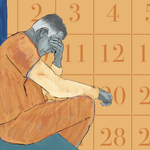Entries by Leah Roemer
News
Aug 25, 2025
State Spotlight: California Death Row Shrinks Sharply in 2024, Driven by the Resentencing of At Least 45 People to Life Sentences or Less
This week we are featuring some articles from the first part of 2025 that we think are worth another look. We’ll be back with new articles next week. This article originally ran on February 11, 2025. When California Governor Gavin Newsom announced a moratorium on executions in 2019, he said that the state’s“death penalty system has been, by all measures, a failure.” He explained that the death penalty“has discriminated against defendants who are mentally ill,…
Read MoreNews
Jun 11, 2025
Anthony Wainwright, Executed June 10 in Florida, Lost Federal Appeals Due to Lawyers’ Mistakes and Indifference and Was Denied Counsel of His Choice
When a lawyer makes a mistake, who suffers the consequences? The“agency principle” says the client does, under the rationale that clients choose their lawyers and authorize their actions. But courts universally apply this principle to all attorney-client relationships, including when indigent, isolated death-sentenced prisoners are appointed attorneys by the state, with little or no means of controlling their lawyers’ actions. Many commentators have noted the…
Read MoreNews
May 28, 2025
The “Fiction of Agency”: Jeffrey Hutchinson Is the Latest of Many Executed After Attorneys Missed Deadlines to File Federal Appeals
On May 1, Jeffrey Hutchinson, a Gulf War veteran, was executed in Florida for the murders of his girlfriend and her three young children. As he fought behind enemy lines in some of the most dangerous regions on earth, bombs rattled and nerve gas corroded his brain, causing permanent damage that would contribute to the tragedy just a few years later.“His mind was a casualty, just like any limb lost in combat,” a group of 129 military veterans wrote in a letter…
Read MoreNews
May 08, 2025
New Analysis: Capital Cases Overturned At Least Four Times Illustrate How Pervasive Prosecutorial Misconduct Contributes to High Cost of Death Penalty
The single most common outcome for a death sentence in the modern era is for it to be reversed on appeal due to a constitutional violation. Most people whose sentences are reversed get resentenced to life in prison or less, but some prosecutors persist in seeking new death sentences even after multiple reversals. A Death Penalty Information Center analysis of the 14 people sentenced to death four or more times for the same crime finds that prosecutorial…
Read MoreNews
Apr 25, 2025
Premature Execution Warrants in Louisiana Deny Death-Sentenced Prisoners Due Process and Fair Consideration of Constitutional Claims
The Supreme Court has consistently held that“death is different”: the“qualitative difference between death and other penalties calls for a greater degree of reliability when the death sentence is imposed.” As a result, capital defendants pursue a series of mandatory and discretionary appeals to ensure that mistakes of constitutional significance are identified and corrected. However, death-sentenced prisoners in Louisiana recently argued that the…
Read MoreNews
Apr 15, 2025
United States Supreme Court Denies Review for Death-Sentenced Missouri Man Whose Jury Foreman Was Removed for Bias
On March 31, the Supreme Court declined to hear the appeal of Lance Shockley of Missouri, the 36th death-sentenced person to be denied certiorari by the Court this year. At trial, Mr. Shockley’s jury foreman was removed before the sentencing phase based on evidence of serious bias — but Mr. Shockley’s attorney declined the opportunity to question the foreman or other jurors about the misconduct, and his conviction, which the foreman participated in, was allowed to…
Read MoreNews
Mar 28, 2025
“He Looks a Little Like the Defendant”: A Closer Look at the History of Racial Bias in Jury Selection
As closing arguments of his trial began in Johnston County, North Carolina, Hasson Bacote watched as Assistant District Attorney Gregory Butler urged the jury to sentence him to death. Mr. Bacote, a Black man, had been convicted of fatally shooting 18-year-old Anthony Surles during a robbery when Mr. Bacote was just 21 years old. Mr. Bacote admitted he had fired a single shot out of a trailer, but said he did not know that he hit anyone.“Hasson Bacote is a thug: cold-blooded…
Read MoreNews
Mar 24, 2025
Four Executions in Three Days Spotlight Constitutional Concerns About Death Penalty
In a three-day span from March 18 to March 20, four men were executed in four different states. Two of the men put to death, in Louisiana and Arizona, were the first executed in their state in years. While the close timing of the executions resulted from independent state-level decisions and individualized legal developments rather than any coordinated national effort, all four executions raised serious constitutional concerns. ### March 18: Jessie Hoffman (LA) On…
Read MoreNews
Feb 11, 2025
State Spotlight: California Death Row Shrinks Sharply in 2024, Driven by the Resentencing of At Least 45 People to Life Sentences or Less
When California Governor Gavin Newsom announced a moratorium on executions in 2019, he said that the state’s“death penalty system has been, by all measures, a failure.” He explained that the death penalty“has discriminated against defendants who are mentally ill, Black and brown, or can’t afford expensive legal representation…[while providing] no public safety benefit or value as a deterrent.” In 2024, California courts agreed that execution was not the…
Read MoreNews
Jan 22, 2025
Supreme Court Rules in Favor of Only Woman on Oklahoma Death Row, Confirming Admission of Prejudicial, Gendered Evidence Can Violate Due Process Rights
At Brenda Andrew’s 2004 trial in Oklahoma for the murder of her husband, the prosecutor called witnesses to testify about her“provocative” clothing and her previous sexual relationships, and questioned“whether a good mother would dress or behave” the way she had. Jurors heard Ms. Andrew called a“hoochie” and a“slut puppy.” In his closing argument, the prosecutor opened a suitcase and showed the jury Ms. Andrew’s underwear, asking,“The grieving widow…
Read More







